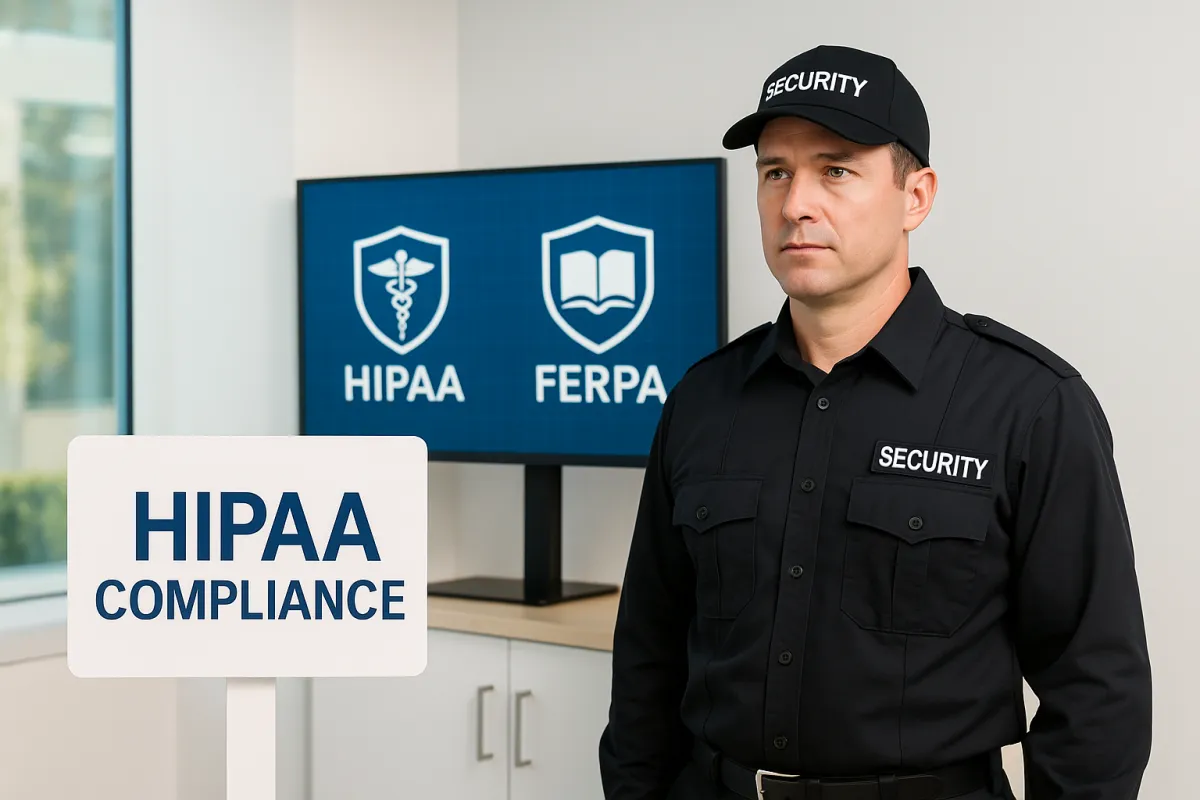Blog & News

HIPAA, FERPA & Security: What Our Guards Know When Securing Sensitive Sites
HIPAA, FERPA & Security: What Our Guards Know When Securing Sensitive Sites
When you entrust a security firm with the protection of sensitive environments—whether a healthcare clinic handling patient records under HIPAA or an educational institution safeguarding student data under FERPA—you expect more than uniformed presence. You need guards who understand the intricacies of federal privacy laws, the consequences of non-compliance, and the protocols that prevent breaches. At Steel Bison Security, our officers receive specialized training to meet these exacting standards.
1. An Overview of HIPAA and FERPA
HIPAA
The Health Insurance Portability and Accountability Act (HIPAA) establishes national standards to protect Protected Health Information (PHI). Covered entities—hospitals, clinics, mental health providers—and their business associates must implement administrative, physical, and technical safeguards to ensure the confidentiality, integrity, and availability of PHI. Learn more on the U.S. Department of Health & Human Services website: HHS HIPAA Overview.
FERPA
The Family Educational Rights and Privacy Act (FERPA) protects the privacy of student education records. Schools and universities receiving federal funding must control access to personally identifiable information, maintain accurate records of disclosures, and allow parents or eligible students to review records. Full details are available at the U.S. Department of Education: ED FERPA Guidance.
Both statutes carry civil and criminal penalties for unauthorized disclosures, making strict adherence non-negotiable for any organization handling PHI or student records.
2. Why Compliance Matters for Security Officers
Security officers are often the first—and last—line of defense in regulated environments. Their actions directly affect:
Physical Safeguards: Preventing unauthorized access to record rooms, server closets, and treatment areas.
Incident Response: Detecting and reporting potential PHI or student record exposures.
Chain of Custody: Ensuring evidence (e.g., surveillance footage, entry logs) remains unaltered for investigations.
Visitor Oversight: Verifying credentials and escorting all non-staff individuals within controlled zones.
A misstep—such as allowing an unescorted visitor into a records room—can result in substantial fines under HIPAA (up to $1.5 million per violation category HHS Civil Penalties) or administrative action under FERPA, including loss of federal funding.
3. Key HIPAA Requirements and Guard Responsibilities
3.1 Physical Safeguards
Facility Access Controls: Guards enforce badge-only entry to areas storing PHI, use key‐card logs, and conduct regular patrols of server rooms and record archives.
Workstation Security: Officers verify that computers displaying electronic health records are locked when unattended and report any unauthorized use.
Device & Media Controls: During off-hours, guards secure backup tapes, laptops, and removable media in locked safes or cabinets.
3.2 Administrative Safeguards
Security Awareness Training: Officers understand how to recognize phishing attempts or social engineering aimed at accessing PHI.
Contingency Planning: In power outages or natural disasters, guards follow documented Emergency Mode Operations Plans to maintain PHI availability and integrity.
3.3 Technical Safeguards (Support Role)
While IT handles encryption and audit controls, guards report any evidence of tampering with access control panels or network cables, ensuring technical protections remain intact.
4. Key FERPA Requirements and Guard Responsibilities
4.1 Protecting Education Records
Controlled Entry: Guards manage access to registrar offices, faculty workrooms, and digital labs where student records are stored.
Escort Protocols: Non-staff, including parents, contractors, or volunteers, are always accompanied by an authorized employee when in sensitive areas.
Disclosure Logs: Officers maintain visitor logs that categorize which records areas were accessed and by whom—critical for FERPA audit trails.
4.2 Notification and Parental Rights
In events such as an intruder in a dormitory or unauthorized request for records, security follows Disclosure Safeguards defined in the institution’s post orders, alerting designated school officials for timely parental notifications.
5. Specialized Training for Sensitive-Site Guards
All guards assigned to HIPAA or FERPA sites complete our Sensitive Site Security Certification, which includes:
Regulatory Deep Dive: Interactive modules on HIPAA Privacy and Security Rules, FERPA definitions, and enforcement actions.
Scenario-Based Drills: Role-playing exercises—such as responding to a tailgating attempt in a medical records corridor or a suspicious individual near a student advising office.
Ethics and Confidentiality Workshops: Emphasizing non-disclosure agreements, professional conduct, and consequences of violations.
Emergency Response Coordination: Joint drills with facility staff and local responders to practice evacuation or lockdown while preserving record integrity.
This curriculum exceeds basic licensing requirements, ensuring our guards operate confidently within privacy-sensitive environments.
6. Access Control and Visitor Management Best Practices
6.1 Multi-Layered Access
Primary Gates/Reception: Verify ID and purpose of visit, issue color-coded badges indicating access level.
Secondary Checkpoints: Badge readers or intercom stations at hallways leading to records rooms or therapy suites.
Tertiary Controls: Locked cabinets or safes for PHI or student files, requiring dual-factor authentication—badge plus PIN or biometric scan.
6.2 Visitor Pre-Registration
Advance Vetting: Facilities use pre-registration portals to collect visitor data, screen against blocklists, and notify hosts via SMS upon arrival.
Digital Badge Printing: Guests receive time-limited RFID badges that deactivate at shift’s end.
6.3 Continuous Monitoring
CCTV Integration: Real-time camera feeds focus on entry points and sensitive areas; officers monitor displays in a secured dispatch center.
Mobile Patrol Apps: Guards log checkpoint visits and scan QR codes at each control point, generating audit trails for compliance reviews.
7. Handling Incidents and Reporting Protocols
7.1 Incident Detection
Guards scan for signs of forced entry, tailgating, or unauthorized media devices. In digital labs, they watch for unattended workstations or open files displaying PHI/student data.
7.2 Immediate Response
Lockdown Procedures: Initiate site-specific lockdown protocols—securing all entrances and coordinating with local law enforcement.
Containment: Prevent further exposure by escorting unauthorized individuals out and securing affected areas.
7.3 Reporting and Documentation
Incident Reports: Detailed, timestamped logs that include photos, witness statements, and sequence of events.
HIPAA Reports: Immediate notification to the facility’s Privacy Officer for potential breach assessment as per HHS Breach Notification Rule.
FERPA Reports: Escalation to the designated school official to determine if the incident constitutes an unpermitted disclosure.
8. Technology Integration to Support Compliance
Encrypted Communication: All radio and mobile-app communications pass through AES-256 encryption to prevent eavesdropping.
Badge Analytics: Software that flags anomalies—such as badges used outside approved hours or multiple attempts at locked doors.
Visitor Management Systems: Cloud-based platforms with role-based access that automatically purge records per retention policies, aiding GDPR and CCPA compliance.
Technology augments human vigilance, creating a resilient, audit-ready security posture.
9. Audits, Drills, and Continuous Improvement
9.1 Regulatory Audits
We conduct internal audits quarterly—verifying license status, training records, and adherence to post orders—and prepare clients for external inspections by accrediting bodies or federal agencies.
9.2 Scenario Drills
Annual full-scale exercises simulate data breaches, active threats, or natural disasters, testing guard response, communication flows, and record-preservation protocols.
9.3 Feedback Loops
Post-incident debriefs involve security, facility managers, and compliance officers to refine SOPs, update training, and incorporate lessons learned into our standard procedures.
10. How Steel Bison Security Ensures Regulatory Adherence
At Steel Bison Security, our compliance framework includes:
Dedicated Compliance Team: Monitors changes in HIPAA, FERPA, and related state laws, promptly updating training and SOPs.
Custom Post Orders: Site-specific documents that map out every checkpoint, record-room access rule, and emergency protocol.
Comprehensive Record-Keeping: Secure digital logs of all patrols, screenings, and incident reports, with encrypted backups.
Client Collaboration: Regular meetings with healthcare or education partners to align security measures with institutional policies.
Ongoing Education: Monthly webinars and yearly recertification to keep officers current on evolving privacy and security requirements.
Visit our contact page to discuss how we can tailor a compliance-centric security solution for your sensitive site.
11. Conclusion
Securing HIPAA- and FERPA-regulated environments demands more than uniformed presence—it requires officers trained in legal mandates, privacy protocols, and specialized response procedures. By combining rigorous training, layered access controls, real-time monitoring, and continuous improvement, Steel Bison Security delivers a security program that not only deters threats but also ensures you remain in full compliance with federal laws. Protect your patients, your students, and your institution’s reputation—partner with us for expert security solutions designed for sensitive sites.
Ready to fortify your HIPAA- or FERPA-compliant facility? Reach out to Steel Bison Security today.

EMAIL ADDRESS
OFFICE NUMBER
OFFICE ADRESS
(WA) 11900 NE First St STE 3066, Bellevue, Wa 98005
(WY) 30 N. Gould St STE R, Sheridan, Wy 82801
Copyright 2024 Steel Bison Security Services
